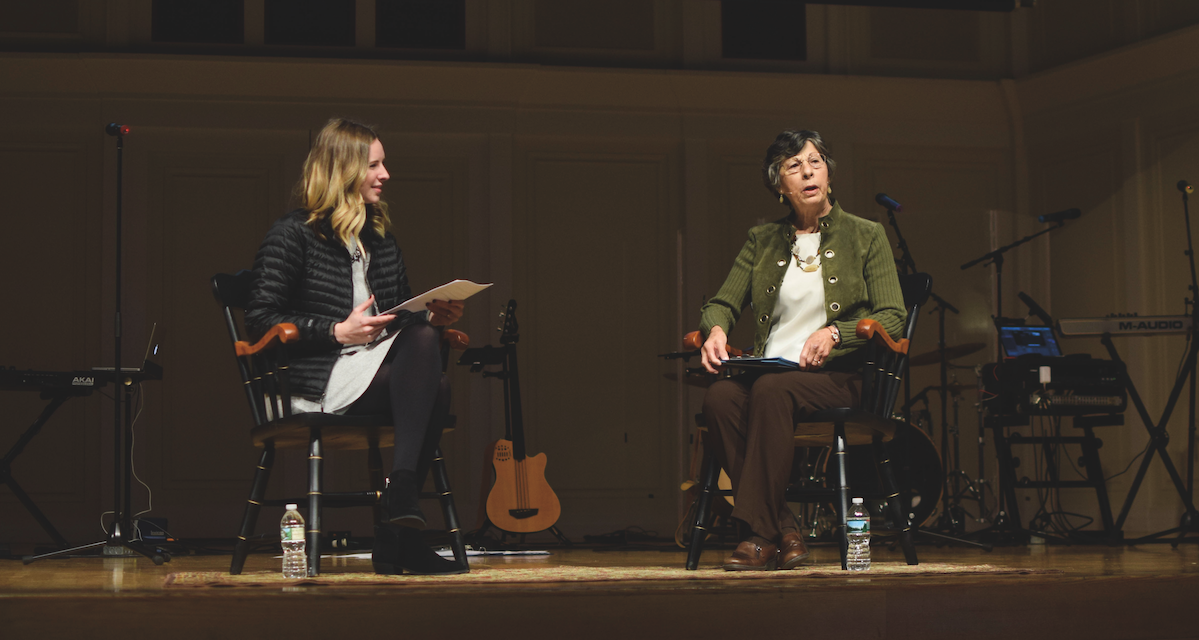Reimagining Shalom
This article originally appeared in the fall 2018 issue of STILLPOINT magazine.
Kelly (Connolly) Palmer ’13, LMSW, is making welcome mats. They say things like Howdy, Hi there and The Colemans. It’s a big change, given that just two years ago she was in Lesvos, at the epicenter of the refugee crisis in Greece— working alongside the very people once nominated for a Nobel Peace Prize for rescuing, feeding and offering shelter to thousands of shipwrecked refugees just off their shores.
It was in Lesvos—after months of distributing hot meals to refugee families, cleaning up debris from refugee boat landings and prepping short-term mission teams to work in the refugee camps— that Palmer (pictured above, left) hit the “red zone”: what she describes as one of three professional burnouts that happened in the five years following her graduation from Gordon.
The other two burnouts were triggered by secondhand trauma experienced during her Master of Social Work internship with International Justice Mission and her work resettling refugees in the area around Fort Worth, TX, with Catholic Charities. Although the work was deeply fulfilling, the grave injustices and trauma Palmer witnessed on a daily basis took a significant toll on her.
After years of heartbreak, Palmer decided to take a yearlong soul sabbatical and pour her time into founding a lettered goods company, Palmer Lettering Co. Although she now spends much of her day calligraphing and painting watercolor place cards, thin-lined Moleskine notebooks and welcome mats, she’s still participating in God’s redemptive narrative. In an age of conflict and crisis, Palmer is furnishing front doors with warm welcomes and an invitation to community.
Palmer’s choice to swap her spot on the front lines of social justice for a world of paintbrushes and welcome mats was largely influenced by Professor of Social Work Sybil Coleman (pictured above, right), her longtime mentor, professor and friend. The two met in Coleman’s Intro to Social Work class. At the time, Palmer was a sophomore at Westmont College and had come to Gordon for a semester through the Christian College Consortium exchange program. “I can still see where she sat,” Coleman says. “She came in with a passion to learn and care for persons at risk. I saw it immediately and was interested in what the Lord had in mind for this woman who I thought I was never going to see again.”
When Palmer returned to Westmont the following semester, she felt God calling her back to Gordon. So she transferred, took all of Coleman’s courses and worked as Coleman’s teaching assistant for three semesters. Then, seven years after that initial social work class—when Palmer was resettling refugees and finding herself in the red zone for the third time—she consulted Coleman, who had so often been “a true north for me in places of confusion,” Palmer says.
“Social work often came at the expense of the rest of my life,” says Palmer. “In having Sybil’s life to look back on, I had this model of someone who was engaged in the work of serving people but could still be whole. I knew that I had to step out completely in order to start tending to and healing the parts of me that had been neglected along the way.”
One part of Palmer’s healing came from Coleman’s help in reframing the whole idea of service—that freedom in Christ didn’t come from embodying the “martyr/savior complex” that she had held onto. In order to serve in a way that didn’t feel so heavy, Palmer had to learn to let a few things go.
“I think part of our learning is to look at what we’ve carried as survival tools and put the ones we don’t need away,” says Coleman. “We get to an age or a stage in life when what served us earlier no longer serves us. We keep carrying it with us when we should be abandoning it. I saw Kelly’s willingness to look at what tools she would carry with her.”
Even though her tools have changed, Palmer is still working toward God’s vision of justice—something she likens to shalom, the act of bringing everything into right relationship with one another, where everything is given the space for maximum flourishing.
Shalom is something others are noticing, too, when encountering Palmer’s artwork. Palmer shares, “A friend of mine told me, ‘It’s so interesting that in a world where there is so much division, you’re engaging in this prophetic act of laying out welcome mats in front of all of these peoples’ doors.’”
As her soul sabbatical nears an end, Palmer plans to keep her paint brush in hand while also pursuing a Master of Divinity. “Social work gave bones and gave a skeleton to my faith,” she says. “And now I’m wanting more of the theological underpinnings.” Along the way, she’ll continue to consult Coleman, both the one that exists in her mind—whispering “Sybil-isms” into her ear like an angel on her shoulder—and the real one who’s only a phone call away.
 The Bell
The Bell